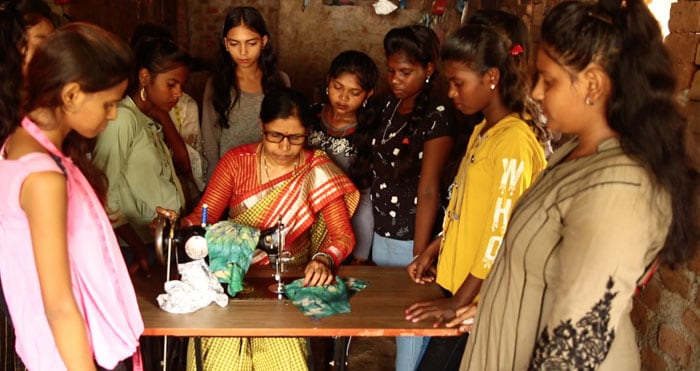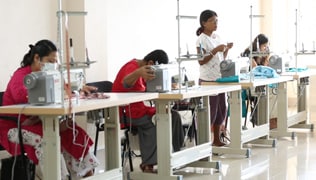- Home/
- About The Initiative
About the Initiative

Kushalta Ke Kadam, an initiative by USHA Silai School and NDTV has entered its tenth season. The aim is to empower women from rural India and encourage them to become entrepreneurs by taking up sewing and training others in their respective communities and helping them open new doors of opportunities for themselves.
USHA Silai School is a community-based initiative with the aim of empowering village women to become entrepreneurs and teach sewing in their respective communities. More than one per cent of the sale of every USHA Sewing Machine is invested into this programme, thereby enabling all Usha customers to share their love with rural women. More than one lakh women are being trained every day.
Since 2011, the USHA Silai School initiative has trained more than 16,22,000 rural women through over 37, 806 Silai schools, spanning over 23,958 villages across 608 districts of 28 states and eight Union Territories of India. The initiative has not only helped women of India, but has also in Nepal, Bhutan, and Sri Lanka.
The women earn Rs 4,000 – Rs 5,000 per month on an average, with the highest recorded monthly earning being Rs. 84,000 in a month. This earning works as a catalyst towards building their self-confidence, reducing gender inequities, and raising their stature within their families and in society at large.
The initiative ties in with the Government’s vision that has placed special emphasis on prioritising skill training and creation of independent livelihoods in the 12th Five-Year-Plan and has worked with 131 NGOs and 73 Corporate/ Government/ PSU/ Institutional partners.
We bring you these stories of transformation and empowerment from the length and breadth of India.
Adopt a Silai School

Do you want to be a part of the huge change that Usha Silai School is bringing about in the lives of millions of rural women? With just a simple click of a button, you can now contribute to the opening of an Usha Silai School or support various other aspects of the school. Donate towards setting up an Usha Silai School by paying Rs 22,000.
Latest Stories
- Team NDTV | Monday February 16, 2026
Odisha's Suchismita Sahu, Rajasthan's Preeti Prajapat, Manipur's Akhirun—Usha Silai School's Kushalta Ke Kadam celebrates these awardees, from homemakers to master trainers earning accolades
- Team NDTV | Thursday February 12, 2026
From Ladakh peaks to Assam fringes, Usha Silai School trains tribal women in Turtuk, Kargil & Dakhinkuchi—crafting livelihoods with armed forces, NHPC & NGOs. Stitching national resilience
- Team NDTV | Thursday January 29, 2026
From West Bengal's transgender tailors to Telangana's tribal seamstresses and Meghalaya's embroidery revivalists, Usha Silai School's Kushalta Ke Kadam partners with NIRDPR and state governments
- Team NDTV | Tuesday February 03, 2026
In Odisha's mining heartlands, Mahanadi Coalfields Limited teams with Usha Silai School's Kushalta Ke Kadam and Gram Utthan, empowering tribal women turning them into entrepreneurs
In Pics

Rebari girls grow up learning traditional embroidery, which along with their new found sewing skills developed at Usha Silai Schools, is helping them earn a living.

Usha Silai School has empowered many rural women to support their family and send their children to school.

The Usha Silai School, established in a small nondescript village that goes by the name of Kottai, is helping empower people from varied communities.

The all-inclusive Usha Silai School Programme covers the entire nation from hamlets tucked between hills to villages cast by the sea.

Vegetables farmers from the Mizoram hills earn very little given the topography of the area. Usha Silai Schools have played an important part in this region by skilling women to financially contribute towards their households.

Usha Silai School learner Lucy has trained seven other women in her community, helping them to become financially independent.

Women like Kaviben from the nomadic Rebari community are finally laying down their roots as they begin to gain financial independence and thereby stability through Usha Silai School.

Usha Silai School, located in the Gujarat's Bhuj village, is enabling rural women to earn as much as Rs. 2,500-4,000 each month.

Usha Silai School, in association with a Gujarat based NGO called Kala Raksha, is trying to bring about a Silai revolution in Bhuj.

Besides training other women from their community, many Usha Silai School learners have become entrepreneurs in their own right.

With sewing becoming easily accessible and lucrative, the silai schools are also helping revive traditional motifs and designs.





